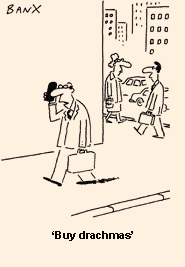Linked in and looking for relief
Roula Khalaf, Editor of the FT, selects her favourite stories in this weekly newsletter.
Call me paranoid. But the facts, as I understand them, are these: I am being followed by a psychiatric professional from the other side of the country – and I don’t know why.
I am not afraid; I’ve seen fire and I’ve seen rain and I will survive. But I am concerned that some of you might find yourselves in a similar situation – maybe even because of me – and I want you to know that you are not alone in this regard.
The crazy thing about my predicament is that this whole thing started so innocently. I was living in London, working for this newspaper as a reporter and having a grand old time getting to know all sorts of interesting people in business. I just wasn’t prepared for what tended to happen after our meetings ended.
In the hours or days that followed, an email would appear in my inbox at work inviting me to join the “professional network” of the person I had just met on a website called LinkedIn. We were all professionals and we were all networking, so I didn’t give this ritual too much thought and accepted the requests in much the same way as I would shake hands or submit to a goodbye kiss on the cheek. It seemed like the friendly thing to do.
But as the number of my contacts soared well into the triple digits, I began to sense trouble. LinkedIn seemed to know a lot about me. It guessed about people I might know – and was frequently correct. It then pointed me in the direction of these people, including the wives of friends, which struck me as a violation of sorts, if not of religious law, at least of the “man rules” cited in numerous US beer advertisements.
Over time, my anxieties grew. LinkedIn regularly updated me about the contacts of my contacts, so it only stood to reason that strangers were learning about me through the people I knew on LinkedIn. I was being watched, in other words, by people I didn’t know – which is uncomfortable for anyone who remembers more of the 20th century than the last two decades (you probably guessed this already, but I haven’t got around to setting up my Facebook page just yet, either).

I assumed this surveillance was being conducted largely by the public relations executives who are paid to put up with people like me. But my view grew a tad more textured recently when I received a LinkedIn invitation from a person with one of those two-part Chinese names you often see on the mainland. I recognised neither half of the moniker but when I clicked on the link, I couldn’t help but notice my new acquaintance’s job description: “Board Certified Psychiatrist at State of California”.
I wondered what this person was doing in my life. One thing that you learn writing a column for the FT – and forgive me for going out on a limb like this – is that we have very perceptive readers. But what did this psychiatrist see in me? Was I an interesting writer? Or was I, let’s face it, a potential patient?
I should have left things there, and walked away. But I’m a curious sort, so I joined the professional network of this California psychiatrist to ask one question: Why me? At press time, I’m still wondering. As is the case with so many of life’s bigger questions, the answer so far has been silence. (Just my luck: I’m being pursued by a California psychiatrist who just doesn’t communicate.)
I realise that the argument could be made that I should leave LinkedIn, if it makes me that uncomfortable. But that’s not as easy as it might seem. I have identified a section on the LinkedIn website that is marked “close your account”. But based on my past encounters with technology companies, I harbour a sneaking suspicion that I will wind up spending considerable time on the telephone with some sad soul in a call centre in Bangalore or some such place before I can actually go.
Besides which, I’m in too deep to quit LinkedIn right now. Many of my contacts on my professional network are real friends, loved ones and colleagues at the FT. Cutting them off after so many years would be something of an insult, wouldn’t it?
As much as I hate to admit it, I am also beginning to feel something on the order of peer pressure when it comes to my professional network on LinkedIn. I realised this a few days ago when I called a colleague to tell her that I was accepting her LinkedIn invitation. She thanked me, only to quickly add that she was surprised at how uninteresting my list of contacts seemed to her. Before I could stop myself, I found myself resolving to connect with a better class of people on LinkedIn.
I wonder what the California psychiatrist would make of that.
Comments